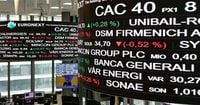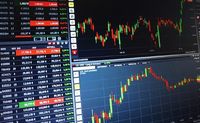In a dramatic shift in U.S. trade policy, President Donald Trump has announced sweeping tariffs on imports that are sending shockwaves through global financial markets. During a press conference at the White House on April 2, 2025, Trump outlined a series of tariffs that will impose a minimum baseline of 10% on almost all imported goods, with additional surcharges for specific countries, particularly China and the European Union.
Beginning this Saturday, April 5, 2025, the new tariffs will affect a wide range of products, although certain categories such as gold bullion, pharmaceuticals, semiconductors, copper, lumber, energy products, and minerals not found in the U.S. will be exempt. Notably, automobile imports will face a hefty 25% surtax, significantly impacting the automotive industry.
The most affected nation will be China, which will see a staggering 34% tax on its products, adding to the existing 20% tariffs already imposed by Washington. This brings the total tax on Chinese goods to an eye-watering 54%. The European Union will face a 20% tariff, while Japan, India, Taiwan, and Vietnam will see tariffs of 24%, 26%, 32%, and 46%, respectively. These tariffs are set to take effect in two phases, with the baseline tariff starting on April 5 and the increased rates following on April 9.
Trump's announcement has sent the financial markets into a tailspin. The Bourse de Paris fell by 1.94% to 7,706.33 points on April 3, 2025, as investors reacted to the unexpected severity of the tariffs. Major companies like EssilorLuxottica, BNP Paribas, and Bureau Veritas saw their stocks drop significantly, reflecting the widespread concern about the potential for a trade war.
"The markets did not appreciate the list of tariffs presented by Trump, and the rates seem higher than anticipated," said economists from ING. Many analysts fear that these tariffs could lead to retaliation from affected countries, escalating tensions and potentially harming global trade.
In the United States, the Dow Jones is projected to open down by 2.5%, with the S&P 500 and Nasdaq expected to fall by more than 3%. Apple, a company heavily reliant on Chinese manufacturing, has already seen its stock drop by more than 7% in pre-market trading. Analysts at Citigroup have warned that if Apple cannot avoid the tariffs, the impact on its gross margins could be significant.
On the international stage, the response has been swift. The Nikkei index in Japan dropped by over 3.3%, and the Hang Seng index in Hong Kong fell by 1.9%. The ripple effects of Trump's tariffs are being felt worldwide, with many investors seeking refuge in safer assets. Gold prices surged to a record high of over $3,167 per ounce, as investors flocked to this traditional safe haven.
Amidst the chaos, the French wine and spirits industry is bracing for a significant downturn, with expectations of a 20% decrease in sales to the U.S. This could result in an estimated loss of 800 million euros for French exporters and 1.6 billion euros for the entire European Union. Emmanuel Macron is scheduled to meet with representatives from affected industries later today to discuss the ramifications of these tariffs.
In the broader context, Deutsche Bank has calculated that the new tariffs could reduce U.S. economic growth by 1% to 1.5% this year, while simultaneously increasing core inflation by the same amount. Michael Feroli, chief economist at JPMorgan, emphasized that the impact of these tariffs could push the economy dangerously close to recession.
As the situation develops, the luxury sector in France is already feeling the strain. Leading companies like LVMH and Hermès have seen their stocks decline sharply, with LVMH down 3.79% and Hermès down 3.34% in the wake of the announcements. The automotive sector, which relies heavily on international supply chains, is also facing significant challenges, with companies like Stellantis and Airbus experiencing notable losses.
Despite the turmoil, some sectors are managing to weather the storm. Pharmaceutical companies, for instance, are not affected by the new tariffs, with shares of Sanofi rising by 0.74%. Additionally, banks with a domestic focus, such as Société Générale and BNP Paribas, have seen their stocks rise significantly this year, suggesting that not all sectors are equally vulnerable to the fallout from Trump's trade policies.
The unfolding trade situation raises questions about the future of U.S. economic policy and its implications for global trade relations. As countries like China and those in the European Union prepare to respond, the potential for a prolonged trade war looms large, with significant consequences for economies worldwide.
In conclusion, Trump's aggressive tariff strategy marks a significant shift in U.S. trade policy, and its impact is being felt across global markets. As investors brace for the potential fallout, the coming days will be critical in determining how countries respond to these unprecedented measures.








